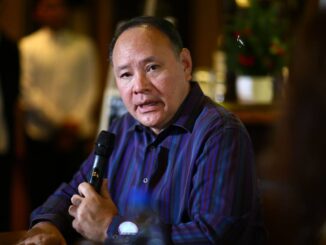
THE government is “nearing the endgame” in its 50-year battle with communist insurgency, National Security Adviser Secretary Eduardo Año said Tuesday.
He said two more guerrilla fronts — one in Central Luzon and another in Surigao del Sur — have been weakened by joint military and police operations.
Armed with the directive of President Ferdinand Marcos Jr. to eliminate all guerrilla fronts by the end of the year, Año, who is also vice chairman of the National Task Force to End Local Communist Armed Conflict (NTF-Elcac), expressed confidence that the task could be realized sooner, not later.
National Security Adviser Secretary Eduardo Año. PHOTO BY J. GERARD SEGUIA
“The movement and efforts of the Armed Forces and the PNP (Philippine National Police) have been very swift. Their original target is [end of] December 2024, but we’re only in August, and we’ve downed another two,” Año said during a dialogue with the media hosted by the National Security Council in Quezon City Tuesday night.
Prior to the creation of the NTF-Elcac, there were 89 known guerrilla fronts around the country.
Since the task force’s inception during the Duterte administration in 2018, at least 17 guerrilla fronts have been weakened or dismantled every year, he said, adding there would be no let up in mop-up efforts until the last guerrilla front has been eliminated.
“The Armed Forces are actually putting more units to go after the remaining guerrilla fronts. And as [chief of staff] Gen. Romeo Brawner himself told the President, he’s very much confident that they can deliver on the order by the end of the year. But even before the end of the year, I think it can be done,” Año said, noting that there are more or less 1,400 rebels still active in the battlefront.
However, they “come and go” thus, they are not considered “quality NPA (New People’s Army) units,” he said.
Año also pointed out that by intensifying military and police operations further, the government, through the NTF-Elcac, would not stop in its efforts to entice insurgents to reintegrate into mainstream society by continuing to provide services such as those included in the Barangay Development Program (BDP), which has been proven successful in areas previously infested and controlled by the NPA.
The BDP is an initiative spearheaded by the local government units where sustainable development programs are established in conflict-prone and conflict-affected communities — including farm-to-market roads, school building, water and sanitation systems, health stations, livelihood projects, rural electrification, housing, and other forms of assistance.
Moreover, Año noted how it was once considered remotely possible that rebels would lay down their arms and return to the folds of the law. But with the government’s unceasing efforts to achieve lasting peace, Filipinos being indoctrinated by the Communist Party of the Philippines and its legal fronts are becoming less and less.
“Here we are now, half a century later, in our battle with these peace spoilers. We have come a long way. It was difficult but well worth it,” Año said.
“But we will not [let our guard down]. They have the capability to resurrect, and a handful of them are still attempting to recruit the youth. We will not stop until all these battle lines are erased,” he said.





Be the first to comment